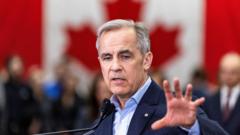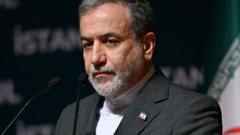Prime Minister Mark Carney's administration is engaged in dialogues with the US over the possible integration into the proposed system, which aims to counter advanced aerial threats while detailing uncertainties in costs and operational involvement.
Canada Considers Joining Trump's Ambitious Golden Dome Defence Initiative

Canada Considers Joining Trump's Ambitious Golden Dome Defence Initiative
In a potential shift in North American security collaboration, Canada is exploring participation in the US's Golden Dome missile defense project.
As part of ongoing discussions surrounding trade and security, Canadian officials confirm their interest in the Golden Dome initiative, announced by President Donald Trump, amid political shifts and evolving defense strategies.
The Canadian government has confirmed that it is actively discussing the possibility of joining President Donald Trump’s proposed Golden Dome missile defense system, a project designed to address emerging aerial threats with advanced technology. Prime Minister Mark Carney’s office revealed ongoing dialogues with US counterparts regarding security frameworks, alongside existing defense collaborations.
The unveiling of the Golden Dome proposal included an estimated initial cost of $25 billion, with the potential for the total budget to rise significantly, drawing skepticism from experts about the feasibility of its broader implementation. "We are having constructive conversations surrounding the enhancement of Norad and initiatives like the Golden Dome," remarked Audrey Champoux, a spokesperson for Carney.
Trump indicated that Canada is showing interest in the system, emphasizing the importance of shared responsibilities in mutual defense. While the timeline aims for operation before Trump’s term concludes, analysts have expressed doubts regarding the complexity of execution and financial demands of such a vast program.
The proposed missile defense strategy aims to encompass advanced threats, including hypersonic missiles, and appears influenced by Israel’s successful Iron Dome initiative. Critics caution that the project may present more challenges than anticipated, particularly in terms of costs and the infrastructure necessary to develop a comprehensive system.
As both Canadian and American officials navigate these discussions, the implications of the Golden Dome initiative could reshape security relations and bolster North America's defense strategy in the coming years.
The Canadian government has confirmed that it is actively discussing the possibility of joining President Donald Trump’s proposed Golden Dome missile defense system, a project designed to address emerging aerial threats with advanced technology. Prime Minister Mark Carney’s office revealed ongoing dialogues with US counterparts regarding security frameworks, alongside existing defense collaborations.
The unveiling of the Golden Dome proposal included an estimated initial cost of $25 billion, with the potential for the total budget to rise significantly, drawing skepticism from experts about the feasibility of its broader implementation. "We are having constructive conversations surrounding the enhancement of Norad and initiatives like the Golden Dome," remarked Audrey Champoux, a spokesperson for Carney.
Trump indicated that Canada is showing interest in the system, emphasizing the importance of shared responsibilities in mutual defense. While the timeline aims for operation before Trump’s term concludes, analysts have expressed doubts regarding the complexity of execution and financial demands of such a vast program.
The proposed missile defense strategy aims to encompass advanced threats, including hypersonic missiles, and appears influenced by Israel’s successful Iron Dome initiative. Critics caution that the project may present more challenges than anticipated, particularly in terms of costs and the infrastructure necessary to develop a comprehensive system.
As both Canadian and American officials navigate these discussions, the implications of the Golden Dome initiative could reshape security relations and bolster North America's defense strategy in the coming years.





















